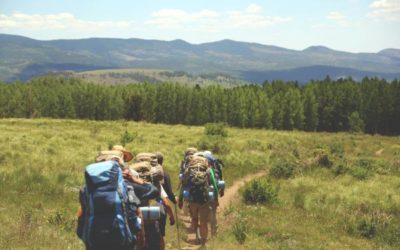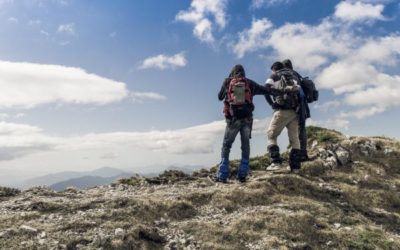When David’s father Jesse sent David to resupply his brothers on the front lines of the battle against the Philistines, David accepted the task. He had no idea his adaptation skills were about to be tested. When he arrived at the battle lines, he expected to find a bunch of men bravely fighting the Philistines. Yet when he rolled in he found that they were timid and leaderless. This was a crisis, which called for leadership. So like godly leaders do, he adapted to the leaderless vacuum. Although too young to be called up as a fighting man, he volunteered:
Let no one lose heart on account of this Philistine: your servant will go and fight him. (v. 32)
Just as David learned adaptation from living as a shepherd in the wilderness, traveling in the wilderness today teaches leaders the skill of adaptation.
1. IF YOU KNOW HOW TO ADAPT, YOU STAND OUT AS A LEADER
In 1 Samuel 17, David abandons the things as they are and adapts to a leaderless vacuum by volunteering to take on the most formidable obstacle facing Israel. I guarantee that as you enter the world of business, ministry, or leadership of any kind, you will have opportunities galore to volunteer to take on the most difficult problems.
Most people run away from them like cockroaches when the lights are turned on. But if you are willing to go above and beyond the call of duty and do what no one else is willing to do, you will have ample opportunity to face giants and get God glory in the process. The opportunities are abounding.
2. DAVID’S ABILITY TO ADAPT CAME FROM CONFIDENCE IN GOD
So why was David able to rapidly decide to jump into the battle? The Scripture tells us why: David was confident in God.
He states boldly to the assembly, “the battle was the Lord’s” (see 1 Samuel 17:47). He knew that the battle belonged to the Lord, and that he was just serving to further what God wanted to do. David was stepping up for God to get glory.
RELATED POST: Don’t Whine, Just Adapt | How the Outdoors Teaches Us Adaptation
3. DAVID COULD ADAPT BECAUSE HE WAS ALSO CONFIDENT IN HIS SKILLS (see 1 Samuel 17:40)
David had already been in a variety of scenarios where he was required to jump into action quickly. When lions and bears attacked his flock he didn’t sit around and weigh the options. No, he took care of business right then and there. Leadership was automatic to him, because of his faith in God and his confidence in his skills with his stone and sling.
Imagine how many thousands of stones David must have thrown to have such confidence? Think about the consistent daily practice that was required to have such confidence that he could catapult a small rock with such accuracy?
 One way I have found to train leaders quickly to develop these kinds of rapid decision-making skills is in the wilderness. I’ve been involved in the field of outdoor leadership for over 22 years, and I can say that the outdoors is truly a perfect laboratory to develop in leaders the ability to adapt. Teaching leaders how to lead in the wilderness is a proven way to rapidly enhance the leadership skill of adaptation, which might otherwise take years in the marketplace to learn. Then leaders can go back to the city equipped for the David-like spiritual battles we all face in ministry. If you want to learn more about using time in the outdoors for personal or group retreats the book, Christian Outdoor Leadership, is a great place to start.
One way I have found to train leaders quickly to develop these kinds of rapid decision-making skills is in the wilderness. I’ve been involved in the field of outdoor leadership for over 22 years, and I can say that the outdoors is truly a perfect laboratory to develop in leaders the ability to adapt. Teaching leaders how to lead in the wilderness is a proven way to rapidly enhance the leadership skill of adaptation, which might otherwise take years in the marketplace to learn. Then leaders can go back to the city equipped for the David-like spiritual battles we all face in ministry. If you want to learn more about using time in the outdoors for personal or group retreats the book, Christian Outdoor Leadership, is a great place to start.
RELATED POST: Experience + Efficiency + Exposure = Rapid Decision-Making Skills
ACTION STEPS
- Think of some young leaders in your arena of influence who you think have great potential to be stand out leaders. Invite them to do something fairly challenging with you in the outdoors in the next few months.
- Then when you are on the adventure, give them some opportunities to make decisions with you in the field and show them how to adapt when conditions change. (No matter how small or large the “change in conditions” you experience, there is always opportunity in the outdoors to model how to adapt.)
- Before you come home debrief some ways to apply what you all learned to life, leadership, ministry.




